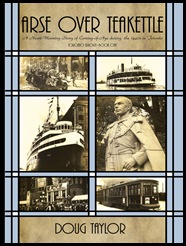After we returned home, my dad was listening to a music program on CKEY. We had no interest in the music, considering it to be “warbling for old folks”—“As Time Goes By” (sung by Rudy Vallee), and “Don’t Get Around Much Any More” (The Ink Spots). When Bing Crosby crooned his hit from two years earlier, “I’m Dreaming of a White Christmas,” we permanently tuned out. We were certain that the snow would soon arrive, so didn’t need to dream about it. We ignored the radio and instead examined the pictures in the Saturday newspaper’s comic section until the radio program finished. However, at 5:30 CKEY presented “The Shadow.” Now this was a program worthy of our attention.
Frank Readick introduced the show, and in a sinister voice, intoned, “Who knows what evil lurks in the hearts of men? The Shadow Knows!” Evil laughter followed, accompanied by ominous organ music resembling that of the “Phantom of the Opera.” Orson Wells read the story. His deep, rich voice related the tale of the crime-fighter Lamont Cranston, who wrapped a black cape around his body and became invisible to the naked eye. He possessed enormous strength, could defy gravity, speak all languages known to man, and unravel the most difficult codes. Lamont terrorized burglars, murders, and other dangerous criminals.
It was a thrilling broadcast, and spawned numerous books. Ken and I loved it all. Perhaps “The Shadow” might keep an eye on the “old sinners” at our church to keep them on the straight and narrow. He might even cook the goose of the big, bad wolf. One lives in hope!
Another program we loved was the “Lone Ranger” and his noble steed Silver. The Lone Ranger was a masked cowboy who struck fear into the hearts of evil men, righting injustices, as he roamed the old west with his sidekick Tonto. The soaring music of Rossini’s “William Tell Overture” introduced the program. After the music climaxed, the narrator proclaimed, A fiery horse with the speed of light, a cloud of dust, and hearty “Hi-yo Silver. In every episode, justice triumphed. At the end of the broadcast, above the clatter of galloping hooves, we heard Hi-yo Silver, away, as the Lone Ranger and Tonto departed the scene. Another voice, dripping with awe, whispered in hushed tones, Who was that masked man?
It’s a pity that real life does not contain such heroes.
The passage quoted above is from the first book of the Toronto Trilogy, “Arse Over Teakettle.” The novel is the story of a boy growing up in Toronto during the 1940s, when the radio played a major role in everyone’s life. The novel is a heart-warming story of a young boy coming-of-age. As he and his friends roam the laneways and streets of their neighbourhood, they seek to know the secrets of the “big boys.” The anecdotes of their sexual explorations are particularly amusing. The book has stories of Sunnyside, The Toronto Islands, and the CNE during the 1940s. Many archival photos are included in the book.
For further information on the three volumes of the Toronto trilogy:
The author’s Home Page:
